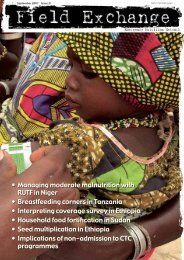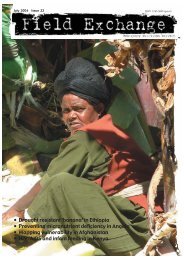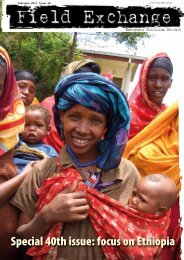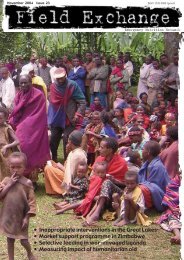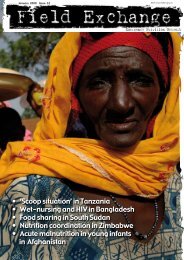Download PDF - Field Exchange - Emergency Nutrition Network
Download PDF - Field Exchange - Emergency Nutrition Network
Download PDF - Field Exchange - Emergency Nutrition Network
You also want an ePaper? Increase the reach of your titles
YUMPU automatically turns print PDFs into web optimized ePapers that Google loves.
<strong>Field</strong> Article<br />
A field article written by Lili Mohiddin from<br />
Oxfam and Mike Abu from Practical Action<br />
describes a newly developed emergency<br />
market mapping and analysis tool and the<br />
experience of applying the tool following tropical<br />
storms in Haiti. The tool allowed for sophisticated<br />
analysis of market conditions leading to<br />
highly nuanced recommendations regarding<br />
interventions in timber and bean markets. The<br />
tool can be used by non-specialists and can<br />
help determine the appropriateness and optimal<br />
design for a broad range of response<br />
options including cash transfers.<br />
This issue of <strong>Field</strong> <strong>Exchange</strong> has its usual fair<br />
share of new and cutting edge programming<br />
initiatives. At a time of deepening gloom over<br />
the global economic downturn and our sleepwalking<br />
into environmental catastrophe,<br />
successful innovation and problem solving in<br />
our sector serves to maintain some degree of<br />
optimism and sense of progress.<br />
A field article by Action Contre la Faim (ACF)<br />
describes their experience of implementing a<br />
new survey method for assessing acute malnutrition<br />
in nomadic pastoralist populations. The<br />
sampling method can be used for collecting<br />
information on many different variables in addition<br />
to malnutrition. In particular, it gets around<br />
problems of selecting a sample in an area with a<br />
mobile, low density population for whom there<br />
are few reliable data on population size at the<br />
community level.<br />
The Italian NGO COOPI (Cooperazione<br />
Internazionale) has contributed a field article<br />
from the Democratic Republic of the Congo<br />
(DRC), which describes another take on estimating<br />
coverage of CTC programmes. Having found<br />
the centric systematic area sampling (CSAS)<br />
approach to be too time consuming and biased<br />
when there is poor mapping detail available<br />
and recent population movement – both problems<br />
they encountered - COOPI developed a<br />
modified approach involving GPS, which they<br />
employed in Goma. This approach appears to<br />
be quicker and more accurate as the first<br />
‘mapping’ phase freed up the survey team,<br />
allowing them to focus their energies on actually<br />
collecting the data.<br />
A paper by the Alchemy project summarises<br />
lessons learnt in implementing micro-credit<br />
and other loan programmes for long term<br />
refugee and displaced populations. Such interventions<br />
have not been widely applied but may<br />
have an important role in certain refugee<br />
contexts.<br />
Finally, a word on our own piece of innovation.<br />
We would like to announce the launch of<br />
the ENNs online forum, en-net, funded by<br />
USAID/OFDA. It will enable field practitioners to<br />
pose urgent and challenging questions they<br />
face on emergency nutrition/food security<br />
programming, and so access a wide range of<br />
experience-based and expert advice that is not<br />
reflected in standard guidelines – a sort of interactive<br />
<strong>Field</strong> <strong>Exchange</strong>. As we launch this initiative,<br />
we welcome feedback on the facility and<br />
look forward to the questions and debate that<br />
materialise and that may well feature in future<br />
issues of <strong>Field</strong> <strong>Exchange</strong>.<br />
Jeremy Shoham<br />
Editor<br />
Any contributions, ideas or topics for future<br />
issues of <strong>Field</strong> <strong>Exchange</strong>? Contact the<br />
editorial team on email: office@ennonline.net<br />
1<br />
Development Assistance Research Associates<br />
2<br />
Food and <strong>Nutrition</strong> Technical Assistance<br />
Diana Hernandez Cordero/Oxfam, Haiti, 2008<br />
This article describes a work in progress by<br />
Oxfam GB in developing a new tool to enable<br />
emergency practitioners to map and analyse<br />
markets in emergencies<br />
Good practice standards 1 , guidelines<br />
and evaluations, all emphasise the<br />
importance of including markets in<br />
emergency situation and response<br />
analysis. However, in practice, emergency<br />
practitioners have often overlooked the potential<br />
and actual role of markets in emergency<br />
and early recovery responses. This is mainly<br />
due to uncertainty of how to understand or<br />
work with traders and other market actors in<br />
an emergency setting, and unfamiliarity with<br />
the private sector. Commonly cited challenges<br />
include not knowing what data to gather and<br />
from where (macro versus micro levels), how<br />
to interpret basic information collected, such<br />
as prices, or how to translate analysis into<br />
programme decisions.<br />
<strong>Emergency</strong> Market<br />
Mapping and Analysis<br />
(EMMA) tool<br />
By Lili Mohiddin and Mike Albu<br />
Banana plantation in Cabaret, 35 km north of Port-au-Prince.<br />
The area's key crop, destroyed by the hurricane.<br />
Lili Mohiddin has been an<br />
<strong>Emergency</strong> Food Security and<br />
Livelihoods Advisor with OXFAM<br />
GB since September 2005, based<br />
in the UK.<br />
Mike Albu is an international projects<br />
manager with the Markets &<br />
Livelihoods programme of<br />
Practical Action since 1999, based<br />
in the UK<br />
Many thanks to the agencies, especially IRC-UK, that have made this work possible in Haiti, Myanmar, Kenya<br />
and in UK and via USA-based discussions and forums. In Haiti, the collaboration of Red Cross (Haiti and<br />
Canada), Oxfam (GB, Intermon and Quebec) and ACDI/ VOCA was vital. Our gratitude goes to Emmet Murphy<br />
and Anita Auerbach who contributed hugely to both the development of EMMA and the pilot in Haiti. Thanks<br />
also to the project donors that include OFDA, Waterloo Foundation and Oxfam GB.<br />
Recent trends in humanitarian responses<br />
indicate an increase in agency use of cashbased<br />
initiatives alongside or in place of<br />
conventional relief distributions of food and<br />
non-food items and local procurement. Some<br />
of these cash interventions are also implemented<br />
without proper assessment of market<br />
actors’ capacity to respond to households<br />
increased purchasing power, or analysis of the<br />
risks of abuse of market-power (uncompetitive<br />
behaviour).<br />
These analytical challenges and implementation<br />
trends indicate the need for better<br />
market analysis capacity. The EMMA<br />
(<strong>Emergency</strong> Market Mapping and Analysis)<br />
tool has been developed for Oxfam GB and<br />
International Rescue Committee UK (IRC) by<br />
Practical Action Consulting to enable more<br />
appropriate emergency and early recovery<br />
responses by enabling agencies to undertake<br />
essential market analysis.<br />
1<br />
Sphere Project 2004 edition<br />
2



